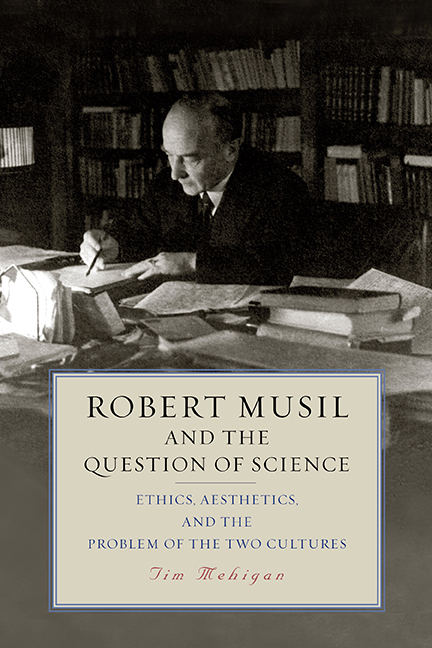Book contents
- Frontmatter
- Contents
- Preface
- Introduction: Musil’s Intellectual Position
- Part I Musil and the Two Cultures
- Part II Aesthetics and Ethics in the Context of the Two Cultures
- Conclusion: “A General Secretariat of Precision and Soul”: Ethics, Knowledge, and Literature after the Fourth Revolution 149
- References
- Index
- Frontmatter
- Contents
- Preface
- Introduction: Musil’s Intellectual Position
- Part I Musil and the Two Cultures
- Part II Aesthetics and Ethics in the Context of the Two Cultures
- Conclusion: “A General Secretariat of Precision and Soul”: Ethics, Knowledge, and Literature after the Fourth Revolution 149
- References
- Index
Summary
ROBERT MUSIL's ESSAYS fall into two distinctive phases of his life and work: the period before the outbreak of the First World War and the period after the war. That Musil made use of the medium of the essay at all can be attributed to his literary program that had stalled before the war: he wanted to clarify his literary intentions and protect his experimental stories, published under the title of Unions in 1911, against crude misunderstandings. We can thus read into Musil's turn to the essay form an educational intention, at least to begin with, that sought both to highlight points of difference in relation to the work of his contemporaries—one thinks particularly of Musil's discussions of Spengler's thought between 1918 and 1921—and also to call attention to related or sympathetic literary undertakings, such as those of Robert Müller.
Nevertheless, if one views the essays in toto, one sees that their educative intention increasingly loses its sharp edge over time. The tenor of Musil's writing in these essays changes, I believe, because Musil begins to see the essay not merely as a vehicle to promote his literary interests, but increasingly as a valuable literary form in its own right. Moreover, if the Unions project had run aground on the suspicion that imaginative writing could not—and perhaps should not—be used for an overriding conceptual or “scientific” purpose, then Musil, as a result of the poor reception given to Unions, was obliged to consider alternative literary forms that might do a better job in helping to fulfill such a purpose. The essay form showed promise in this regard. On the face of it, the essay is a “cool” medium that sets out to promote dispassionate reflection on the topics that make up its subject matter—not infrequently matters of current social or political concern. If the essay could now be put to work alongside literature, where topics and themes are broached from the perspective of the emotions—an avowedly “hot” medium—then Musil would be much closer to realizing his ambition to unify conceptual and emotional reflection. This unification would be built on assumptions that only the combination of concept and emotion would be able to deliver the kind of insights necessary for the development of ethical understanding.
Information
- Type
- Chapter
- Information
- Robert Musil and the Question of ScienceEthics, Aesthetics, and the Problem of the Two Cultures, pp. 63 - 76Publisher: Boydell & BrewerPrint publication year: 2020
